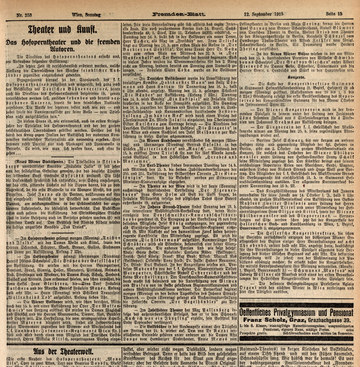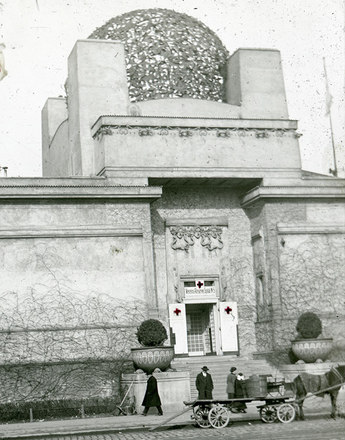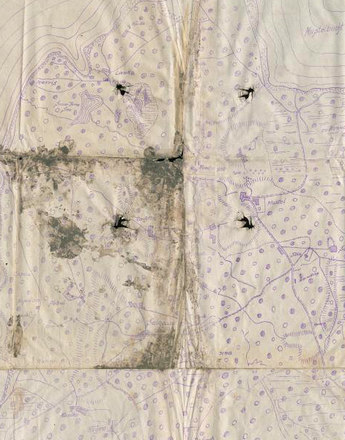Serious Times – Serious Art
On the occasion of the birthday of Emperor Franz Joseph in August 1914 the Deutsches Volkstheater, one of the few theatres in Vienna that did not shut on the outbreak of war, invited patrons to attend a special performance whose profits would be handed over to the Red Cross. The programme was in all respects that of a patriotic event in time of war, with Franz Grillparzer’s version of the Austrian national anthem being followed by scenes from Friedrich Schiller’s dramas Wilhelm Tell and Wallensteins Lager (Wallenstein’s Camp). The musical part reached its first climax with the performance of the song Die Wacht am Rhein (The Watch on the Rhine):
The audience rose from their seats. There were loud cheers, and they were kept up while the ‘Radetzky March’ and the ‘Song of Prince Eugene’ were played; the audience then joined in the singing of the Austrian and Prussian national anthems, and finally there were more loud cheers to greet the song ‘O du mein Österreich’ (O Thou My Austria)!
This repertoire provided the basis for all such patriotic events at various theatres in the Monarchy, for example in Prague at the Neues Deutsches Theater (nowadays Státni opera Praha) with its musical director Alexander Zemlinsky at the beginning of September and also in Vienna on 3 October at a special charity concert given by members of the ensemble of the Court Opera and the Vienna Philharmonic Orchestra. Julius Korngold was accordingly content and noted on the occasion of the charity concert that it was ‘an extraordinary event, an uplifting outburst of a feeling of community … a confirmation in music of the will of the brotherhood in arms of Germany and Austria-Hungary to achieve victory’. When the Court Opera reopened he was also content with the choice of the first three works to be performed: ‘Wagner, Mozart, Beethoven: they indicate the intention to give preference to serious art in serious times.’ Korngold also gave a positive verdict on the performance of Wagner’s Lohengrin which opened the season, because ‘a wealth of links to the present flow towards the listener, so that in both the first and the third acts he can seize on them with enthusiasm’.
Richard Specht, the editor of the respected musical journal Der Merker, gave an overall positive assessment of musical life in the first season of the war: the performances of serious symphonic music with their focus on Beethoven, Bruckner and Brahms had been ‘packed’. He did, though, criticize the Court Opera’s programme, because it did not show enough courage when it came to new works and could at least have included more performances of Wagner, ‘whose work like no other’s reflects the mood and content of the essence of what is German and uplifting in the present time’. However, a note made in connection with a reception for journalists when a review of the 1914-15 season was presented shows that Wagner was represented with eleven works in thirty-eight performances – and that on a total of 145 days on which there were performances.
A problem for theatres was posed by the demand for ‘enemy’ compositions to be banned from programmes. This boycott also had economic consequences, as box-office hits like the operas of Verdi and Puccini, or Bizet’s Carmen, were supposed to be taken out of the repertoire. At least Hans Gregor, the director of the Court Opera, did not fully comply with this directive: his theatre’s provisional programme for 1915-16 included Carmen, Les Contes d’Hoffmann, Rigoletto, Il Trovatore, La traviata, Aida, Il Barbiere di Siviglia, Otello and other operas by ‘enemy aliens’. It is also worthy of note that La Bohème, Tosca and Madame Butterfly were scheduled for performance, that is to say no fewer than three operas by the otherwise scorned Puccini. In January 1918 three deputies belonging to the German National Association tabled an indignant question in the Chamber of Deputies on the subject of the alleged preference for ‘foreign and enemy authors’ on the part of the management of the Court Opera:
Is His Excellency aware of the outrageous preferential treatment given to foreign composers on the part of the management of the Court Opera and what action does His Excellency propose to take in future to prevent such practices, which offend the national sentiments of the German population of Vienna and harm German composers? In particular what does His Excellency propose to do to restrain the demonstration which it is feared may follow the planned first performance of a Czech national opera in Vienna [Jenůfa by Leoš Janáček] and the counter-demonstration which this will understandably cause?
Translation: Leigh Bailey
Nussbaumer, Martina: „Jetzt ist die Stunde da, in der nur das Höchste laut werden darf.“ Zur Aufrüstung des klassischen Musiklebens, in: Pfoser, Alfred, Weigl, Andreas (Hrsg.): Im Epizentrum des Zusammenbruchs, Wien 2013, 374-385
Regler, Liselotte: Hans Gregor – Die Ära des letzten Hofoperndirektors in Wien. Dissertation Wien 2010, unter: http://othes.univie.ac.at/10107/1/2010-05-10_9008228.pdf (20.06.2014)
Quotes:
„The audience rose from their seats ...“: Wiener Tagblatt, 18.8.1914 (Translation)
„an extraordinary event ...": Neue Freie Presse vom 4.10.1914, 1 (Translation)
„Wagner, Mozart, Beethoven ...", „aktuellen Beziehungen strömten dem Zuhörer ...": Neue Freie Presse vom 19.10.1914, 8 (Translation)
„packed’“, „whose work like no other’s ...": Specht, Richard: Die Wiener Theater und das Publikum im Kriegsjahr, in: Der Merker 6/15+16, 1915, 549-557, hier: 555f., zitiert nach Nussbaumer, Martina: „Jetzt ist die Stunde da, in der nur das Höchste laut werden darf.“ Zur Aufrüstung des klassischen Musiklebens, in: Pfoser, Alfred, Weigl, Andreas (Hrsg.): Im Epizentrum des Zusammenbruchs, Wien 2013, 374-385, hier: 379 (Translation)
„Is His Excellency aware ...": Fremdenblatt vom 30.1.1918. Unter: http://www.digital.wienbibliothek.at/wk/periodical/pageview/717596 (20.06.2014) (Translation)
-
Chapters
- ‘Long jackets instead of Tailcoats’ – The Music Business in Times of Austerity
- Arousing Patriotic Sentiments in the Concert of Nations
- ‘In War the Muses Learn How to Serve’
- Serious Times – Serious Art
- ‘I’d like to dance, I’d like to shout for joy’ – Popular Music in the First World War
- ‘German Musical Life and How to Delouse It’ – Music for Use in the War
- ‘What the soldier in battle dress is singing now will be sung by the entire German people in rare unity.’ – Soldiers’ Songs as Collectors’ Items
- ‘It’s Hugo’s damned duty not to die for the fatherland before I’ve got my Act III.’ – Richard Strauss and the First World War
- Militarism and Terror Set to Music
- ‘La Victoire en chantant’ – The French chanson in the First World War
- Musical Innovations in the First World War
- Composers’ Fates: War, Death and the Longing for Peace and Overcoming Memories
- Star Composers and the Great War





